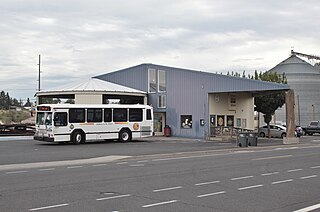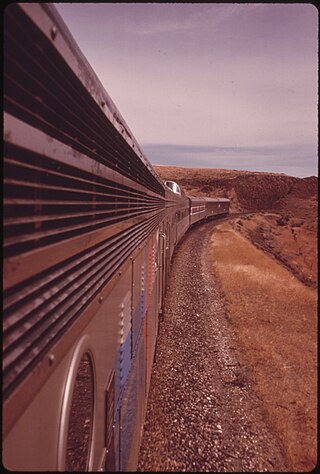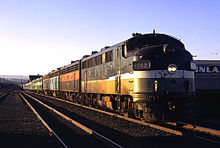
The Empire Builder is a daily long-distance passenger train operated by Amtrak between Chicago and either Seattle or Portland via two sections west of Spokane. Introduced in 1929, it was the flagship passenger train of the Great Northern Railway and was retained by Amtrak when it took over intercity rail service in 1971.

Saint Paul Union Depot is a historic railroad station and intermodal transit hub in the Lowertown neighborhood of Saint Paul, Minnesota. It serves light rail, intercity rail, intercity bus, and local bus services.

The North Coast Limited was a named passenger train operated by the Northern Pacific Railway between Chicago and Seattle via Bismarck, North Dakota. It started on April 29, 1900, and continued as a Burlington Northern Railroad train after the merger on March 2, 1970 with Great Northern Railway and the Chicago, Burlington and Quincy Railroad. The next year, it ceased operations after the trains which left their originating stations on April 30, 1971, the day before Amtrak began service, arrived at their destinations.

The North Coast Hiawatha was a long-distance passenger train operated by Amtrak between Chicago, Illinois, and Seattle, Washington.

Midway is a former Amtrak intercity train station in the Midway neighborhood of Saint Paul, Minnesota, United States. It was last served by Amtrak's daily Empire Builder, with service from Chicago, Illinois to Seattle, Washington or Portland, Oregon. When the station opened March 1, 1978, it was also served briefly by the long-distance North Coast Hiawatha, and the Hiawatha and Arrowhead, the latter combined as the North Star later that year.

The Olympian and its successor the Olympian Hiawatha were passenger trains operated by the Chicago, Milwaukee, St. Paul and Pacific Railroad between Chicago and the Pacific Northwest. The Olympian operated from 1911 to 1947 and was, along with its running mate the Columbian, the first all-steel train to operate in the Pacific Northwest. The streamlined Olympian Hiawatha operated from 1947 to 1961 and was one of several Milwaukee Road trains to carry the name "Hiawatha". The Olympian Hiawatha was designed by industrial designer Brooks Stevens and included the distinctive glassed-in "Skytop" observation-sleeping cars. It later featured full-length "Super Dome" cars.

Edmonds station is a train station serving the city of Edmonds, Washington, in the United States. The station is served by Amtrak's Cascades and Empire Builder routes, as well as Sound Transit's N Line, a Sounder commuter rail service which runs between Everett and Seattle. It is located west of Downtown Edmonds adjacent to the city's ferry terminal, served by the Edmonds–Kingston ferry, and a Community Transit bus station. Edmonds station has a passenger waiting room and a single platform.

Ephrata is a train station on Amtrak's Empire Builder line in Ephrata, Washington. The station and parking are owned by the city government, while the track and platforms are owned by BNSF Railway. Northwestern Trailways provides inter-city bus transportation next to the station while local transit is provided by the Grant Transit Authority.

Columbia Station, also known as Wenatchee station, is an intermodal train and bus station in Wenatchee, Washington, United States. It is a stop on Amtrak's Empire Builder train and is the main hub for Link Transit, the local bus system serving Wenatchee and surrounding areas. The station is also served by intercity buses operated by Grant Transit Authority, Northwestern Trailways, and Travel Washington.

The Northern Transcon, a route operated by the BNSF Railway, traverses the most northerly route of any railroad in the western United States. This route was originally part of the Chicago, Burlington and Quincy Railroad, Northern Pacific Railway, Great Northern Railway and Spokane, Portland and Seattle Railway systems, merged into the Burlington Northern Railroad system in 1970.

La Crosse station is an Amtrak intercity train station in La Crosse, Wisconsin, served by the daily Borealis and Empire Builder. The station was built in 1926–27 by the Chicago, Milwaukee, St. Paul, and Pacific Railroad, replacing an older station that burned in 1916. The station was listed on the National Register of Historic Places as the Chicago, Milwaukee and St. Paul Railway Depot and was renovated in 2001.

Fargo Station is a train station in Fargo, North Dakota, United States. It is served by Amtrak's Empire Builder. It is the only railway station in use in the Fargo-Moorhead area and is the third-busiest in North Dakota. The platform, tracks, and station are currently all owned by BNSF Railway. The station is currently located in the former BNSF freight house. The former main station building is now home to Great Northern Bicycle Co.

Livingston Depot is a former train station in Livingston, Montana, built by the Northern Pacific Railway in 1902. The station last saw passenger rail service in 1979 when Amtrak discontinued the North Coast Hiawatha. Since 1987 the restored building has anchored Livingston's downtown historic district as the Livingston Depot Center.

The Minneapolis Great Northern Depot, also known as Great Northern Station, was a passenger railroad station which served Minneapolis, Minnesota, USA. It was built in 1913 and demolished in 1978. It was located on Hennepin Avenue next to the Hennepin Avenue Bridge and across the street from the main Minneapolis Post Office.

The Expo '74 was a passenger train operated by Amtrak between Spokane and Seattle, Washington. It operated in the summer months of 1974 in coordination with its namesake, Expo '74. With the addition of the Expo '74 to the Empire Builder and North Coast Hiawatha, Amtrak provided thrice-daily service between Seattle and Spokane, the highest level seen since Amtrak's formation and unmatched since.

The Borealis, referred to as Twin Cities–Milwaukee–Chicago (TCMC) during planning, is an Amtrak inter-city rail service that operates daily between Chicago, Illinois, and Saint Paul, Minnesota, via Milwaukee, Wisconsin. Service began on May 21, 2024, under the Amtrak Midwest brand.

The Butte Depot is a Northern Pacific Railway train station in Butte, Montana, built in 1906. It originally served both the Northern Pacific and Union Pacific railroads. In 1970 the NP merged with the Chicago, Burlington and Quincy Railroad, Great Northern Railway, and Spokane, Portland and Seattle Railway, forming the facility's new owner, the Burlington Northern Railroad; passenger train service was taken over by Amtrak in 1971. In 1979 Amtrak discontinued the North Coast Hiawatha due to budget cuts, leaving the Empire Builder on the former Great Northern Railway line, as the only passenger rail service through Montana.

Glendive Depot is an office building and former train station in Glendive, Montana. The Northern Pacific Railway established the town in 1881 and opened the first depot in 1882. The present depot building was built in 1922 and is part of the Merrill Avenue Historic District.

The Willmar station of Willmar, Minnesota was built in 1948, replacing an 1892 Cass Gilbert designed depot. It served the Great Northern Railway and its successor Burlington Northern until 1971. Thereafter, passenger service continued under Amtrak, but with only a single route through Willmar, the Empire Builder. After the North Coast Hiawatha, which ran on the former Northern Pacific Railway line from Minneapolis to Fargo, ended service in 1979, the Empire Builder moved to that corridor.

Bozeman Depot is a former train station in Bozeman, Montana, opened in 1883 by the Northern Pacific Railway. The current brick station house was built in 1892 and expanded in 1924.























